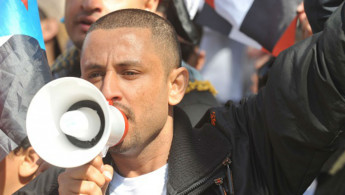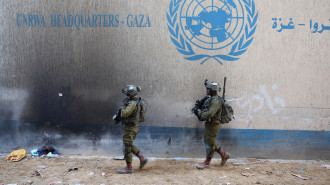The silencing voice of the law in Arab states
The report, released earlier in January, is entitled "Silencing voices with the force of law."
It claims that Arab states attempt to stifle freedom of speech by following set patterns of legislation and prosecution that are increasingly mirroring one another.
The ANHRI was founded in 2003 as a non-governmental organisation and particularly focuses on the support of freedom of expression across the Arab world.
The report focuses on how different Arab states are using very similar legislation and prosecution strategies to stifle dissenting voices in their countries.
 |
Arab states attempt to stifle freedom of speech by following set patterns of legislation and prosecution |  |
"Prosecutions play a big part in the violation to the right of freedom of opinion, freedom of expression and all else that comes under that, including free press and media across the Arab region," the report states.
Three broad categories of state prosecutions that restrict the freedom of speech were identified by the report as being common to Arab states.
Subsequently, victims of state censorship across the Arab world are consistently presented by Arab governments as violators of state legislation who are simply being subjected to justice and the rule of law following due process.
The ANHRI report also says that Arab states have increasingly "flexible" definitions of "breaking the law" that make it easy for governmental bodies to prosecute those whom they wish.
Read also: Which countries banned The New Arab
The report emphasises how the abuse and restriction of freedom of speech is realised most emphatically by "nearly-identical" strategies to "uphold the law."
The ever-widening net of 'authorities' whom none can insult
Rulers in the Arab world are viewed with some sort of sanctity and are not addressed in media except with respect, the report finds.
 |
Rulers in the Arab world are viewed with some sort of sanctity |  |
But its findings show how defending against "insults to authority" has become a mechanism of abuse of free speech that it is most damning.
"Protecting authority from criticism" is now one of the major functions of state legislation the report finds, as those "insulting" the state or its leading figures are often prosecuted.
Critically, the net of those protected from insults seems only to be getting wider and its use ever more common.
High in the list as to be expected are prosecutions for people "insulting the President, King or Emir." But also included are those prosecuted for "spreading false news" about individuals or governmental institutions.
Only last week Egypt saw six local journalists referred to trial for "spreading false news" about corrupt land sales involving the justice minister.
Friends also get favours.
New but not surprising to the list are prosecutions for insulting leaders of "foreign" friendly nations.
The report focuses particularly in this regard on Kuwait. It notes that in the last three years there have been 160 cases for "insulting the Emir," mostly via tweets on Twitter and in the press.
It may come almost as a surprise that the number of cases exceeds that of the charges made under Gaddafi's 42-year-rule, which saw 45 cases.
In Bahrain, the number of judicial trials for "insulting the king" is also on the rise, with the report quoting the Association of Bahraini Press and the Bahrain Centre for Human Rights.
Journalists, lawyers and political activists have all been charged in this regard, but the law does not only apply to the general public.
 |
Former Bahrain MP Khalid Abdelaal was sentenced by a criminal court in May last year to one year in prison also for 'insulting the King' |  |
Former Bahrain MP Khalid Abdelaal was sentenced by a criminal court in May last year to one year in prison also for "insulting the King."
Also protected from "insults" are lower ranking state officials and even "state committees."
In Kuwait 180 Biduns (a minority ethnic group) were charged with resisting and insulting the police when they were arrested during demonstrations in 2011 and 2012.
In Saudi Arabia, a criminal court in Riyadh convicted lawyers Abdulrahman Subaihi, Bandar Anakithan and Abdulrahman Rumaih to prison terms ranging from five to eight years for charges that included "insulting the judiciary" when they retweeted and shared cartoons that allegedly mocked the Ministry of Justice.
The convicted trio were also banned from travelling, appearing on television and using social media.
The misuse of 'inviolability' and 'sanctity'
"Protecting religion and public morals" was the second common strategy of certain Arab goverments to stifle freedom of speech, according to the report.
Authorities have accused a myriad of writers, journalists, activists and social media users who often participate in philosophical and religious debate of being not in line with the Islamic ruling of the state.
Individuals have been charged with "defaming religions and the [legal] religious schools," and "inciting morality and indecency".
It found that Kuwait and Jordan have the highest number of charges for "contempt of religion".
The case of Raif Badawi in Saudi Arabia - charged with "insulting Islam" - has recently become subject of prominent coverage in the international media and amongst human rights organisations.
'Censorship' through Regulation
Official Regulation and codes of practise pertaining to press and media operations are included within the final broad area of legislation through which select Arab governments have sought to restrict the freedom of expression.
States have imposed complex restrictions on the means of communications used to access and exchange information, it adds, covering the "performance" of journalism and the legal remit of newspapers, radio and television outlets.
The report highlights Egypt as a country where stringent regulation is indicative of intense censorship.
Conditions for "legal journalism" in Egyptian law were set following a raft of legislation in the 1970s and similar regulations are found in Jordan and Lebanon.
Regulations include that "journalists" should join and be registered on the lists of national trade unions.
Those who do not fulfil the requirements can be charged with "impersonating a journalist."
In 2014, the ANHRI released a report focusing particularly on restrictions emanated from the necessity to be members of these unions and the ideological conditions imposed by governments therein.
In a statement accompanying the release of the 2016 report, ANHRI called on human rights activists in the Arab world to place the reform of legislation that "contradicts the right to freedom of expression" to the "top of their priorities."

![Palestinians mourned the victims of an Israeli strike on Deir al-Balah [Getty]](/sites/default/files/styles/image_684x385/public/2024-11/GettyImages-2182362043.jpg?h=199d8c1f&itok=xSHZFbmc)


![The law could be enforced against teachers without prior notice [Getty]](/sites/default/files/styles/image_684x385/public/2178740715.jpeg?h=a5f2f23a&itok=hnqrCS4x)
 Follow the Middle East's top stories in English at The New Arab on Google News
Follow the Middle East's top stories in English at The New Arab on Google News


